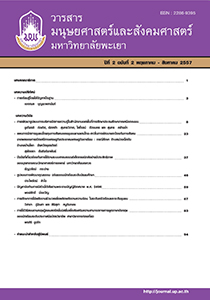การใช้วิธีสอนตามทฤษฎีคอนสตรัคชั่นนิสซึ่มเพื่อส่งเสริมความสามารถทางการพูดภาษาอังกฤษของนักเรียนระดับประกาศนียบัตรวิชาชีพ สาขาวิชาการท่องเที่ยว
Keywords:
ทฤษฎีคอนสตรัคชั่นนิสซึ่ม, ความสามารถทางการพูดภาษาอังกฤษ, Constructionism Theory, English Speaking AbilityAbstract
การวิจัยในครั้งนี้มีวัตถุประสงค์เพื่อศึกษาความสามารถทางการพูดภาษาอังกฤษของนักเรียนที่ได้รับการสอนตามแนวทฤษฎีคอนสตรัคชั่นนิสซึ่ม กลุ่มตัวอย่างที่ใช้ในการวิจัยครั้งนี้เป็นนักเรียนระดับประกาศนียบัตรวิชาชีพ สาขาวิชาการท่องเที่ยว ชั้นปีที่ 3 โรงเรียนลำปางพาณิชยการและเทคโนโลยี ในภาคเรียนที่ 1 ปีการศึกษา 2557จำนวน 20 คน เครื่องมือที่ใช้ในการวิจัยประกอบด้วย แผนการสอนที่ใช้ทฤษฎีคอนสตรัคชั่นนิสซึ่ม จำนวน 1 แผ่น แบบทดสอบความสามารถทางการพูดภาษาอังกฤษและแบบสัมภาษณ์ความคิดเห็นของนักเรียนต่อการเรียนภาษาอังกฤษตามแนวคิดทฤษฎีคอนตรัคชั่นนิสซึ่ม ข้อมูลได้รับการวิเคราะห์เพื่อหาค่าเฉลี่ย ร้อยละ ส่วนเบี่ยงเบนมาตรฐาน และค่าทดสอบที ผลการวิจัยแสดงให้เห็นว่านักเรียนมีความสามารถทางการพูดภาษาอังกฤษสูงขึ้น หลังได้รับการสอนตามทฤษฎีคอนสตรัคชั่นนิสซึ่ม และนักเรียนมีความคิดเห็นเชิงบวกต่อการเรียนภาษาอังกฤษตามทฤษฎีคอนสตรัคชั่นนิสซึ่ม
Implementation of Constructionism Learning Theory to Promote English Speaking Ability of Vocational Students Majoring in Tourism
Pornsiri Oupakham
Faculty of Humanities Naresuan University
This study aims to examine the impact of using the Constructionism Theory on students’ English speaking ability and explore opinions towards the adopted method. The participants were 20 third-year vocational students at Lampang College of Commerce and Technology. In this study, the research instruments were the lesson plan using the Constructionism Theory, English Speaking Ability Test (i.e. pre- and post- tests), and interviews. The data were analyzed by using frequency, percentage, mean, standard deviation, and t-test. The results showed that this teaching method significantly improved the participant s’ speaking abilities. In addition, the participants had very positive attitudes towards this teaching method.
Downloads
How to Cite
Issue
Section
License
ผู้นิพนธ์ต้องรับผิดชอบข้อความในบทนิพนธ์ของตน มหาวิทยาลัยพะเยาไม่จำเป็นต้องเห็นด้วยกับบทความที่ตีพิมพ์เสมอไป ผู้สนใจสามารถคัดลอก และนำไปใช้ได้ แต่จะต้องขออนุมัติเจ้าของ และได้รับการอนุมัติเป็นลายลักษณ์อักษรก่อน พร้อมกับมีการอ้างอิงและกล่าวคำขอบคุณให้ถูกต้องด้วย
The authors are themselves responsible for their contents. Signed articles may not always reflect the opinion of University of Phayao. The articles can be reproduced and reprinted, provided that permission is given by the authors and acknowledgement must be given.








